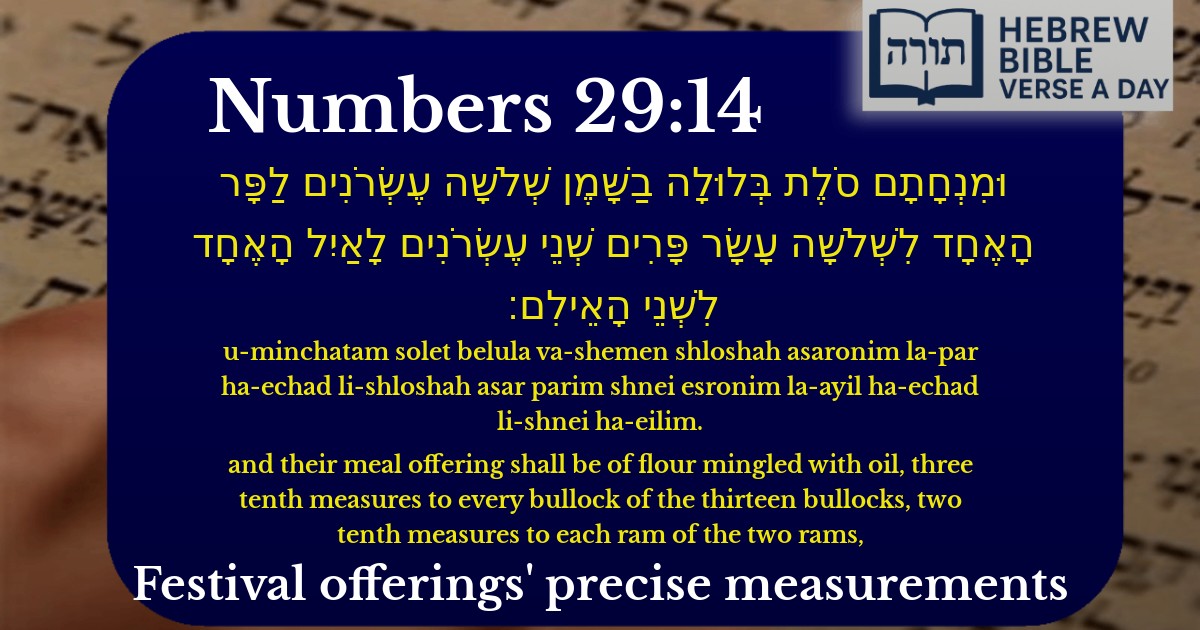Join Our Newsletter To Be Informed When New Videos Are Posted
Join the thousands of fellow Studends who rely on our videos to learn how to read the bible in Hebrew for free!
Hebrew Text
וּמִנְחָתָם סֹלֶת בְּלוּלָה בַשָּׁמֶן שְׁלֹשָׁה עֶשְׂרֹנִים לַפָּר הָאֶחָד לִשְׁלֹשָׁה עָשָׂר פָּרִים שְׁנֵי עֶשְׂרֹנִים לָאַיִל הָאֶחָד לִשְׁנֵי הָאֵילִם׃
English Translation
and their meal offering shall be of flour mingled with oil, three tenth measures to every bullock of the thirteen bullocks, two tenth measures to each ram of the two rams,
Transliteration
U-minchatam solet belula va-shemen shloshah asaronim la-par ha-echad li-shloshah asar parim shnei esronim la-ayil ha-echad li-shnei ha-eilim.
Hebrew Leining Text
וּמִ֨נְחָתָ֔ם סֹ֖לֶת בְּלוּלָ֣ה בַשָּׁ֑מֶן שְׁלֹשָׁ֨ה עֶשְׂרֹנִ֜ים לַפָּ֣ר הָֽאֶחָ֗ד לִשְׁלֹשָׁ֤ה עָשָׂר֙ פָּרִ֔ים שְׁנֵ֤י עֶשְׂרֹנִים֙ לָאַ֣יִל הָֽאֶחָ֔ד לִשְׁנֵ֖י הָאֵילִֽם׃
Parasha Commentary
📚 Talmud Citations
This verse is not quoted in the Talmud.


Explanation of the Verse in Context
This verse (Numbers 29:14) details the meal offerings (mincha) accompanying the sacrifices during the festival of Sukkot. The offerings consist of fine flour (solet) mixed with oil, with specific quantities for the bulls and rams. The verse emphasizes the precision required in sacrificial service, reflecting the importance of devotion and exactitude in divine worship.
Rashi's Commentary
Rashi (Rabbi Shlomo Yitzchaki) explains that the quantities mentioned—three tenths of an ephah for each bull and two tenths for each ram—are consistent with the standard measurements for meal offerings accompanying animal sacrifices (see Leviticus 2). He notes that the number of bulls decreases each day of Sukkot (from 13 on the first day to 7 on the seventh day), but the meal offering per bull remains the same, underscoring the principle that each sacrifice retains its individual significance.
Rambam's Perspective
Rambam (Maimonides) in Hilchot Temidin uMusafin (Laws of Regular and Additional Offerings) discusses the importance of these offerings as part of the communal worship during festivals. He emphasizes that the meal offerings, though secondary to the animal sacrifices, are integral to the completeness of the service, symbolizing gratitude and submission to Hashem.
Symbolism of the Meal Offering
Midrashic Insights
The Midrash (Bamidbar Rabbah 21:25) connects the decreasing number of bulls to the diminishing influence of the nations (symbolized by the 70 bulls offered during Sukkot), while the consistency of the meal offerings represents the eternal and unchanging nature of Israel's devotion to Hashem.